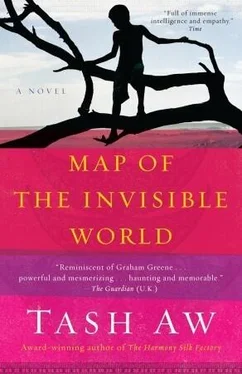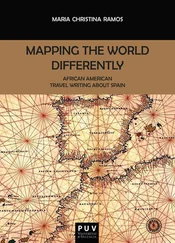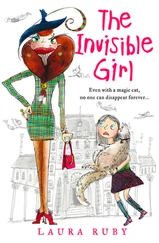Tash Aw - Map of the Invisible World
Здесь есть возможность читать онлайн «Tash Aw - Map of the Invisible World» — ознакомительный отрывок электронной книги совершенно бесплатно, а после прочтения отрывка купить полную версию. В некоторых случаях можно слушать аудио, скачать через торрент в формате fb2 и присутствует краткое содержание. Год выпуска: 2010, Издательство: Spiegel & Grau, Жанр: Современная проза, на английском языке. Описание произведения, (предисловие) а так же отзывы посетителей доступны на портале библиотеки ЛибКат.
- Название:Map of the Invisible World
- Автор:
- Издательство:Spiegel & Grau
- Жанр:
- Год:2010
- ISBN:нет данных
- Рейтинг книги:4 / 5. Голосов: 1
-
Избранное:Добавить в избранное
- Отзывы:
-
Ваша оценка:
- 80
- 1
- 2
- 3
- 4
- 5
Map of the Invisible World: краткое содержание, описание и аннотация
Предлагаем к чтению аннотацию, описание, краткое содержание или предисловие (зависит от того, что написал сам автор книги «Map of the Invisible World»). Если вы не нашли необходимую информацию о книге — напишите в комментариях, мы постараемся отыскать её.
comes an enthralling novel that evokes an exotic yet turbulent place and time—1960s Indonesia during President Sukarno’s drive to purge the country of its colonial past. A page-turning story,
follows the journeys of two brothers and an American woman who are indelibly marked by the past — and swept up in the tides of history.
Map of the Invisible World — читать онлайн ознакомительный отрывок
Ниже представлен текст книги, разбитый по страницам. Система сохранения места последней прочитанной страницы, позволяет с удобством читать онлайн бесплатно книгу «Map of the Invisible World», без необходимости каждый раз заново искать на чём Вы остановились. Поставьте закладку, и сможете в любой момент перейти на страницу, на которой закончили чтение.
Интервал:
Закладка:
— Oh no, Johan, you know we’re not supposed to talk about that. She put her hand on his.
That’s such a stupid rule. Why? I do—
Shhh, she said.
He liked the sound her lips made. You’re the only one I can talk to, Farah, the only who has ever—
No, Mummy cares. She loves you.
No, he said. She needs me.
They did not stop. They drove through the silent city.
10
A fter Margaret left the house Adam found himself alone, again.
Being alone was not something he was good at. He had realized this over the past week, during his long voyage through the islands and along the never-ending sweep of the Great Post Road through Java. There had rarely been a moment when he had been physically on his own. Whether on the boat from Perdo or the bus coming into Surabaya, he had been surrounded by people, by bodies that jostled against him and voices that shouted obscenities at him. Waiting for the bus in a village near Yogya he had endured a whole evening of an old Madurese woman reminiscing about the island she had left behind; he sat under purple neon lights, listening to her tales of knife fights and ghosts. On the ferry three nights before, he had listened to a young couple sing songs of love while he was throwing up violently into the dark blue water. The words had spun wildly in his head— “across the wide wide sea I will wait wait for you you” —making the rocking of the boat seem even worse. And yet, in spite of the endless cacophony and the crush of people, he had begun to realize just how alone he felt. He had also begun to realize how little he liked it. Loneliness, this curious state of being alone, was not something he had ever experienced in his life with Karl. It had not even crossed his mind that he should ever feel alone. In fact he had, if anything, only known the opposite sensation, of wanting to be rid of Karl, to be alone in that house by the sea.
During the seemingly endless bus ride on the Great Post Road, punctuated by nighttime stops at nameless villages, he had tried to think about whether he had ever been lonely at the orphanage. He was never left on his own, of that he was certain. There were always other boys around him, and though their faces eluded him, their presence remained: a shifting mass of bodies swirling around him, even in his sleep. But in this shadowy crowd he had never felt alone, or even lonely, as he did now, because there had always been someone more constant with him, someone who remained by his side and was not part of the amorphous mass — Johan, whose face he could not, sadly, recall. He closed his eyes. The bus jolted as it rumbled over the potholes; his bottom felt sore and he could feel the metal bars through the thin vinyl-covered seat. He knew that Johan’s face would not miraculously appear to him after all these years, but he could not resist reconstructing his brother, as he so often did, in these drowsy presleep moments, using the few fragments he had retained: Johan’s perfectly straight bearing (he had been the tallest of all the boys in the orphanage); his shaven head (that one was easy: They had all had shaved heads); his curiously long fingers, with the middle three on each hand exactly the same length, so that when he held them together they seemed squared-off, cut neatly at the end; his earlobes (or at least one of them) shaped like a tiny, fleshy flower that you could reach out and pinch, time and time again, but never crush; and finally this: the smell of soap mixed with something harsher, like turpentine, or kerosene — he could not be sure of this last detail. Adam was no longer even frustrated by the fact that Johan’s face remained elusive. He re-created Johan’s entire being, as he always did, imagining how he might look today; and yet he resisted giving his brother the final defining features: no eyes, no lips, no nose. He knew that whatever details he supplied would be wrong.
He went to the back of the house, where Margaret had indicated he would find a shower. There was a bathroom, not dissimilar to the one he and Karl had at home, but much smaller and dimmer, its zinc roof covering only half the space, leaving the rest exposed to the sunless sky. One half of the floor was damp and smooth, the other pockmarked with star-shaped bird droppings and bits of dead leaves that had not yet been cleaned up. There was a hose attached at one end to a tap; the other end disappeared into a bucket that had holes drilled into its base. Adam turned on the taps and watched the water begin to fall, rainlike, onto the smooth stone floor. At home they had a large earthenware pot from which they scooped water with a pail, sluicing themselves generously; he wasn’t certain what these tentative streams of water would do. He stood under this miniature rain shower; it felt odd to be standing naked in the rain, and Adam could not decide if it was pleasant or not. He let the droplets wash over him for a few minutes, slowly becoming more at ease, though when he turned the tap off he was still unconvinced by this new method of washing.
At least he was clean again. He had hated wearing the same clothes for a week, hated the way people looked at him as if he were just another street urchin. There had been that Chinese shopkeeper in Magelang who had chased him out of the shop when he had gone in to look for something to eat. Adam had barely touched the bag of dried squid before the man had come after him, waving a stick at him as if he had been a dog, and he had run away, his face hot with shame, even though he had done nothing wrong. In the hour before rejoining his bus, everyone had looked at him in that suspicious, wary way as he wandered the streets in the fading afternoon, in that town between two great mountains. He had never felt so dirty in all his life.
He made his way to the kitchen and began opening the cupboards tentatively, but found only an almost-empty jar of peanut butter and a few cans of something called ravioli, which seemed utterly mysterious to him. He searched for a can opener but could not find one. Meals were never this complicated at home. Adam just turned up at the dinner table and the food was there, prepared either by Ibu Som, who came every other day to help with the housework, or by Karl himself. These meals were always simple, especially when Karl cooked. Often they ate only plain steamed rice (which Karl had never managed to master, and consequently, emerged from the pot in stodgy wet lumps) with some sambal or pickles. During these meals they would eat quickly and in silence, and Adam would know not to ask why they could not have the type of food Ibu Som cooked; he understood that Karl was making some sort of point by eating as simply as possible. He knew that it was to do with “empathy for our fellow citizens” and “not profiting from the misfortune of others, just because we have more money.” At one of these Spartan dinners, even though he had not uttered a word, Karl had caught his eye and said, “It’s just a reminder.” Adam was not sure what this was a reminder of, but he had chosen not to ask.
He opened the refrigerator and found a hard, putrid lump. Its label read ROMANO WHEEL. It did not smell at all appealing, but memories of dinners at home had sharpened his hunger and he cut a wedge of cheese and ate it. He cut the rest of the lump into pieces and put them on a plate, wanting to arrange them like spokes of a wheel but finding instead that they created a miniature atoll, like the haphazard clumps of coral on the seabed as he drifted over them. As he ate, he opened his notebook and wrote:
Things to Tell Margaret
my father was wearing a blue shirt when they took him away
it was definitely soldiers and not the PKI.
(Communists always kill their captives, soldiers don’t always)
Читать дальшеИнтервал:
Закладка:
Похожие книги на «Map of the Invisible World»
Представляем Вашему вниманию похожие книги на «Map of the Invisible World» списком для выбора. Мы отобрали схожую по названию и смыслу литературу в надежде предоставить читателям больше вариантов отыскать новые, интересные, ещё непрочитанные произведения.
Обсуждение, отзывы о книге «Map of the Invisible World» и просто собственные мнения читателей. Оставьте ваши комментарии, напишите, что Вы думаете о произведении, его смысле или главных героях. Укажите что конкретно понравилось, а что нет, и почему Вы так считаете.












